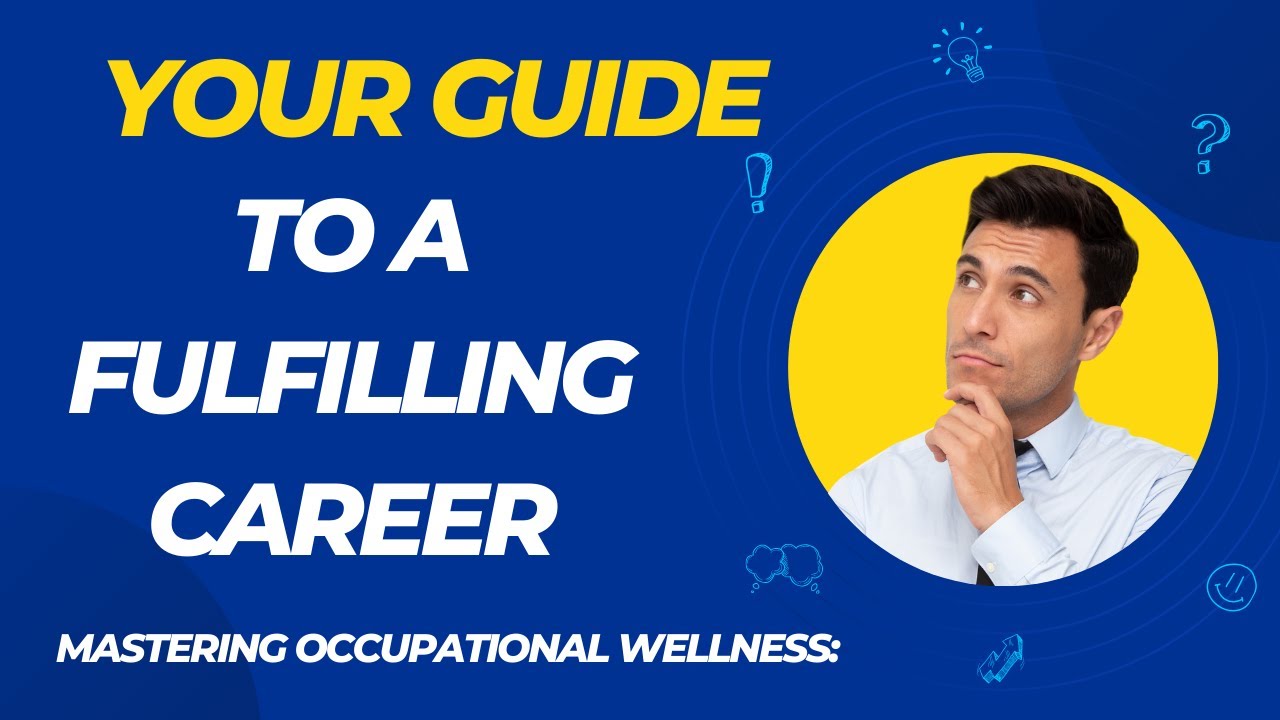Occupational Wellness: Finding Fulfillment in Your Career
Welcome to our blog! In today’s fast-paced world, it’s easy to get caught up in the daily grind of work without taking a step back to evaluate whether our careers are truly fulfilling us. That’s why we’re excited to dive into the topic of occupational wellness and explore ways to find satisfaction and meaning in our careers. It’s a subject that affects us all, regardless of our job titles or industries. So, whether you’re just starting in your career or have been in the workforce for years, we hope this article will provide valuable insights and inspiration to help you achieve a more fulfilling work life.
What is Occupational Wellness?
Occupational wellness refers to the overall sense of fulfillment and satisfaction that one derives from their career or profession. It is the belief that work should be meaningful and rewarding and that it should align with one’s values, passions, and goals. Occupational wellness involves finding a balance between personal and professional life, setting and achieving career goals, and constantly seeking growth and development in one’s chosen field.
Occupational wellness is an essential aspect of overall well-being and contributes significantly to a person’s happiness and quality of life. When individuals are satisfied with their careers, they are more likely to experience higher levels of job satisfaction, increased motivation and productivity, and improved mental and emotional well-being.
Why Occupational Wellness is Important in Your Career
Occupational wellness plays a crucial role in shaping the trajectory of your career and overall job satisfaction. When you have a sense of occupational wellness, you are more likely to experience the following benefits:
Job Satisfaction: When your career aligns with your passions and values, you are more likely to find joy and fulfillment in your work. This leads to a higher level of job satisfaction, which in turn improves your overall well-being.
Motivation and Productivity: When you are engaged in work that resonates with your values and passions, you are naturally more motivated and driven to excel. This increased motivation leads to higher levels of productivity and performance, ultimately benefiting both you and your employer.
Career Growth and Development: Occupational wellness involves a commitment to continuous learning and growth in your chosen field. By investing in professional development opportunities and seeking new challenges, you can enhance your skills, broaden your knowledge, and increase your chances of career advancement.
Assessing Your Occupational Wellness
To achieve occupational wellness, it is necessary to assess your current career situation and determine whether it aligns with your values and passions. Here are a few steps you can take to assess and enhance your occupational wellness:
Identifying Your Values and Passions: Take the time to reflect on your core values and what truly excites and inspires you. Explore different activities and experiences that bring you joy and fulfillment in both personal and professional settings. This self-reflection will help you gain clarity on what matters most to you in your career.
Evaluating Your Current Career Situation: Assess whether your current job or profession aligns with your values and passions. Consider the aspects of your work that bring you satisfaction and those that cause frustration or dissatisfaction. This evaluation will help you identify areas where you may need to make changes or adjustments to improve your occupational wellness.
Setting Career Goals: Once you have a clear understanding of your values and passions, it is important to set meaningful career goals. These goals should be specific, measurable, and aligned with your personal values and passions. Setting both short-term and long-term goals will provide you with a clear direction and sense of purpose in your career.
https://fiscalfitnessflow.com/index.php/2023/11/24/dimensions-of-health-and-wellness-achieving-optimal-well-being/
Tips for Achieving Occupational Wellness
Now that you have assessed your occupational wellness, here are some tips to help you achieve a greater sense of fulfillment in your career:
1. Explore your passions and interests
Discovering your passions and interests is crucial for achieving occupational wellness. Here are a few ways to uncover what truly excites you:
Reflect on past experiences: Think about moments in your life when you felt most engaged and energized. Identify patterns and themes that emerge from these experiences to gain insights into your passions.
Try new things: Step out of your comfort zone and explore different activities or hobbies. Engaging in new experiences can help you discover new passions and interests that you might have never considered before.
Seek inspiration from others: Surround yourself with people who are passionate about their work. Learn from their experiences and let their enthusiasm ignite your own passions.
2. Set meaningful career goals
Once you have a clear understanding of your passions, it is important to set meaningful career goals that align with your values. Here are some guidelines to consider when setting your goals:
Make them specific and measurable: Clearly define what you want to achieve and establish milestones to track your progress. This will help you stay focused and motivated along the way.
Set both short-term and long-term goals: Break down your larger career aspirations into smaller, more achievable steps. This will provide you with a sense of accomplishment and motivation as you reach each milestone.
Align them with your values and passions: Ensure that your career goals are in line with your personal values and passions. This will give your work a deeper meaning and make it more fulfilling.
3. Develop a career action plan
Creating a career action plan will help you turn your goals into reality. Here are some steps to follow:
Identify steps to achieve your goals: Break down your goals into smaller actionable steps. This will make them more manageable and achievable.
Break them down into manageable tasks: Divide each step into smaller tasks that you can work on systematically. This will help you stay organized and make progress toward your goals.
Set deadlines for each task: Assign deadlines for each task to ensure that you stay on track and complete them promptly.
4. Seek professional development opportunities
Continuous learning and growth are essential for occupational wellness. Here are a few ways you can enhance your skills and knowledge:
Attend workshops and conferences: Participate in professional development events and gain new insights and perspectives in your field.
Take online courses: Explore online learning platforms and enroll in courses that align with your career goals. This will help you gain new skills and stay updated with industry trends.
Seek mentorship or coaching: Find experienced professionals in your field who can provide guidance and support. Their expertise and advice can help you navigate your career path more effectively.
5. Maintain work-life balance
Achieving occupational wellness also involves maintaining a healthy work-life balance. Here are some strategies to help you achieve this balance:
Set boundaries between work and personal life: Establish clear boundaries and allocate specific times for work and personal activities. This will help you prevent work from encroaching on your personal life and vice versa.
Prioritize self-care: Make time for activities that rejuvenate and recharge you. Engage in hobbies, exercise regularly, and prioritize your mental and physical well-being.
Practice stress management techniques: Develop effective stress management techniques such as mindfulness, meditation, or deep breathing exercises. These practices will help you maintain calmness and resilience in the face of work-related challenges.
6. Cultivate a positive work environment
Creating a positive work environment is essential for achieving occupational wellness. Here are a few ways you can contribute to a positive workplace:
Foster open communication: Encourage open and honest communication among team members. This will foster trust, collaboration, and a sense of belonging within the workplace.
Promote teamwork and collaboration: Encourage teamwork and create opportunities for collaboration. This will enhance job satisfaction and create a supportive work environment.
Recognize and appreciate employees’ contributions: Acknowledge and appreciate the efforts and achievements of your colleagues. This will boost morale and create a culture of appreciation within the workplace.
7. Seek support and guidance
Lastly, seeking support and guidance is crucial for achieving occupational wellness. Here are some resources you can tap into:
Networking with professionals in your field: Connect with professionals in your industry through networking events, professional organizations, or online platforms. Their insights and experiences can be valuable in navigating your career path.
Joining career-oriented communities: Join online communities or forums related to your career field. Engaging with like-minded individuals can provide support, advice, and inspiration.
Consulting career counselors or coaches: Consider seeking guidance from career counselors or coaches who can help you gain clarity, set goals, and develop strategies to achieve occupational wellness.
Conclusion: Achieving Occupational Wellness and Career Fulfillment
Achieving occupational wellness is a continuous journey that requires self-reflection, goal setting, and a commitment to growth and development. By exploring your passions, setting meaningful goals, creating a career action plan, and prioritizing work-life balance, you can achieve greater fulfillment in your career. Additionally, cultivating a positive work environment and seeking support and guidance from others will further contribute to your occupational wellness. Remember, occupational wellness is not just about success in your career, but about finding true fulfillment and happiness in the work you do.
FAQ’s
What is occupational wellness and why is it important?
Occupational wellness refers to finding fulfillment and satisfaction in your career. It involves aligning your work with your values, interests, and skills, and maintaining a healthy work-life balance. Occupational wellness is crucial for overall well-being as it contributes to happiness, productivity, and personal growth.
How can I determine if my current career path aligns with my values and interests?
To assess if your career path aligns with your values and interests, reflect on what truly matters to you and what brings you joy. Consider the tasks, responsibilities, and overall purpose of your current job. Ask yourself if it allows you to utilize your strengths and if it fulfills your passions. Seeking guidance from career counselors or taking career assessments can also provide valuable insights.
What steps can I take to find more fulfillment in my current job?
To find more fulfillment in your current job, start by identifying areas that you find meaningful and enjoyable. Look for opportunities to take on new challenges or projects that align with your interests. Seek out professional development opportunities to enhance your skills and knowledge. Additionally, building positive relationships with colleagues and creating a healthy work-life balance can contribute to greater satisfaction in your job.
How can I transition into a career that brings me more fulfillment?
Transitioning into a career that brings you more fulfillment requires careful planning and preparation. Begin by researching and exploring potential career options that align with your passions and values. Consider acquiring additional education or training if necessary. Networking with professionals in your desired field can also provide valuable insights and potential job opportunities. Lastly, have a well-thought-out transition plan and be willing to take calculated risks.
What are some signs that indicate I may need to make a change in my career?
Several signs may indicate a need for a career change, such as feeling consistently unhappy or unfulfilled in your job, experiencing burnout, lacking motivation, or feeling a lack of alignment with your values and interests. Other signs may include feeling stagnant in your career growth or having a strong desire for a new challenge. Trusting your instincts and seeking guidance from career professionals can help you make an informed decision.







